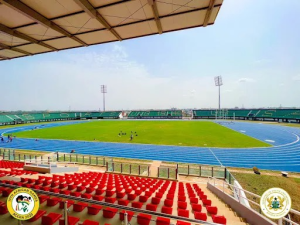The Commissioner of the Commission on Human Rights and Administrative Justice (CHRAJ), Joseph Akanjolenur Whittal, has hailed Ghana’s performance at the United Nations (UN) Universal Peer Review on human rights.
He said Ghana’s report was so well received by the UN Human Rights Council; and that the nation had been highly commended for the steps it had taken so far in meeting its obligations.
He said Ghana’s impressive performance at the UPR had progressed through the first and second to the third cycle due to adequate gathering of information and processing by key stakeholders.
The UPR is a unique mechanism of the Human Rights Council (HRC) aimed at improving the human rights situation on the ground of each of the 193 UN Member States.
Under this mechanism, the human rights situation of all UN Member States is reviewed every five years.
Mr. Whittal gave the commendation in an interview with the Ghana News Agency on the side-line of the opening of a National Multi-Stakeholder Workshop to dialogue on the Implementation Plan for Recommendations that were made to Ghana during a review of its human rights record in November 2017 by the UN Human Rights Council under the UN UPR Mechanism.
The two-day meeting was organised by the POS Foundation (which serves as the Secretariat for the Ghana Human Rights NGO Forum) and the UPR Info Africa Office, Kenya, in partnership with the Ministry of Justice and the UN Office, Ghana.
It is being attended by representatives of relevant Ministries, Departments and Agencies (MDAs), Civil Society Organisations, Development Partners and members of the diplomatic community.
Mr. Whittal recounted that 2017 UPR report submitted by Ghana was enriched because CHRAJ, instead of sending its own independent report took time off and worked closely with the Attorney General’s office in preparing the document which was a state document.
He said in the process, CHRAJ could not even send its own independent report; stating that however, the state comes first and the Commission had been pushing for the establishment of an inter-ministerial committee on the UPR, and if possible with representative from civil society organisations.
He noted that every country normally set up an inter-ministerial committee that would from the day of accepting the recommendation start working on the report up to the mid-term report and beyond.
The Commissioner said the 212 recommendations, which were accepted by Ghana this time around were actually some of the ones that the nation was in the process of implementing already and the only problematic area was the death penalty which was tied to the Constitutional Review; declaring that “in the absence of a referendum, you cannot change death penalty in Ghana”.
“So that is a structural problem and we are not getting signals from the Government whether the Constitution will be amended.”
Mr Whittal said the death penalty was still going to be a problem because Ghana must report whether it had abolished the death penalty or not.“So if you have not amended your constitution and there must be a referendum, how are you going to report on this? He quizzed.
On the workshop, Mr Whittal said it was important the UPR recommendations were made known to the people of Ghana and lauded the media for playing an active role in the dissemination of UPR information to the populace.
“Let the people know what Ghana accepted as recommendations to implement because the weakness in the past two cycles is that when we bring the recommendations to the country, nobody even gets to know what it is that Ghana accepted,” he stated.
He said it was the responsibility of the media and civil society to let the people of Ghana know the UPR recommendations to country, which would enable them mount pressure on the Government to either make the funds available or development partners with support to make funds available and get Parliament to pass the legislation which was necessary because some of them required passage of laws.
He said they were hoping that Parliament would have passed the Right to Information (RTI) Bill before they went for the UPR session since last November.
The Executive Director POS Foundation and Vice Chairman Ghana Human Rights NGOs Forum, Jonathan Osei Owusu, said the objective of the workshop was to foster cooperation among Government and CSOs on the implementation and monitoring of UPR Recommendations through the review and discussion of a proposed Implementation Plan.
On the expected outcomes of the workshop, Mr. Osei Owusu said it would increase awareness of the UPR among all stakeholders, including the public, at national level.













